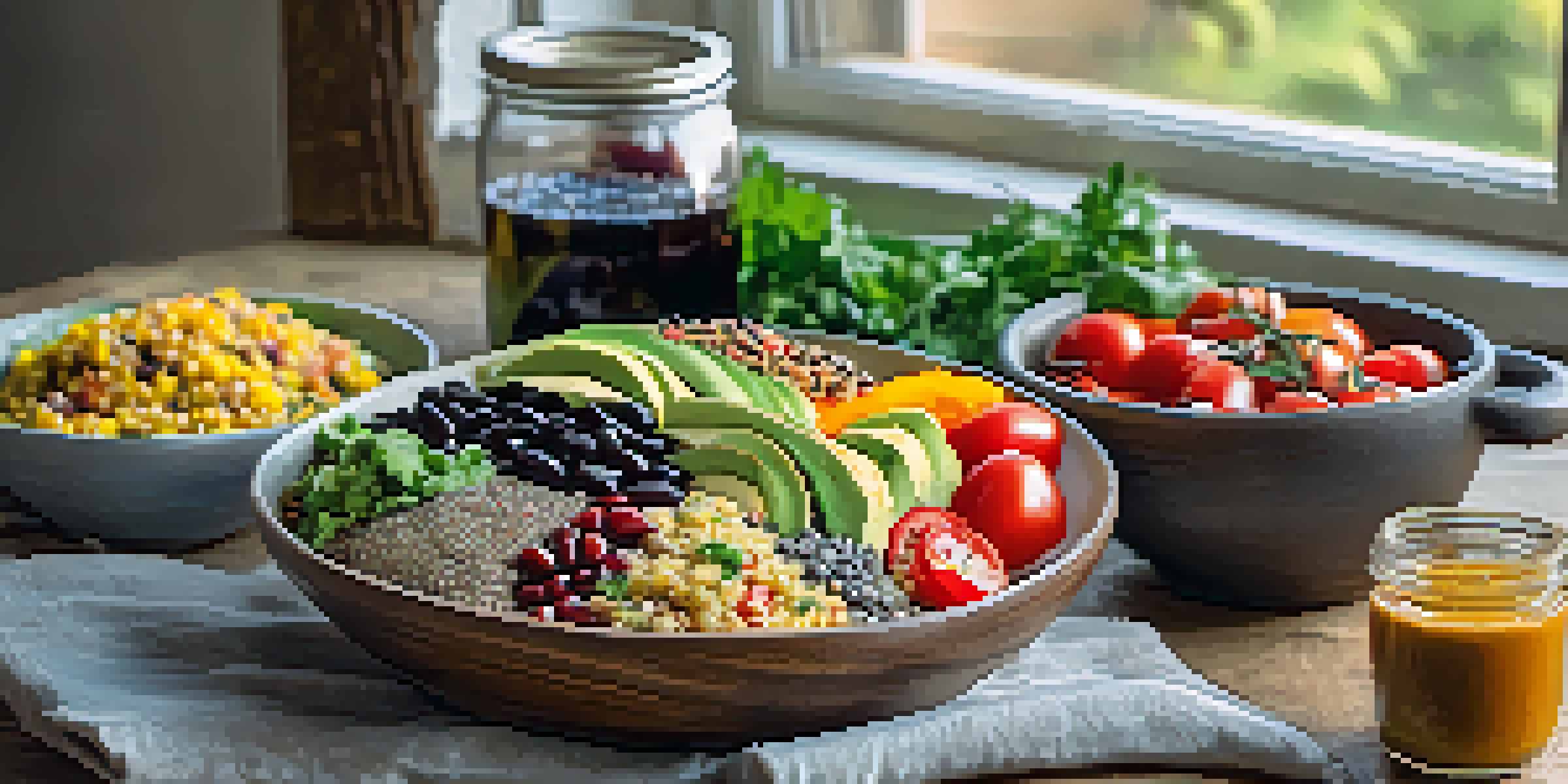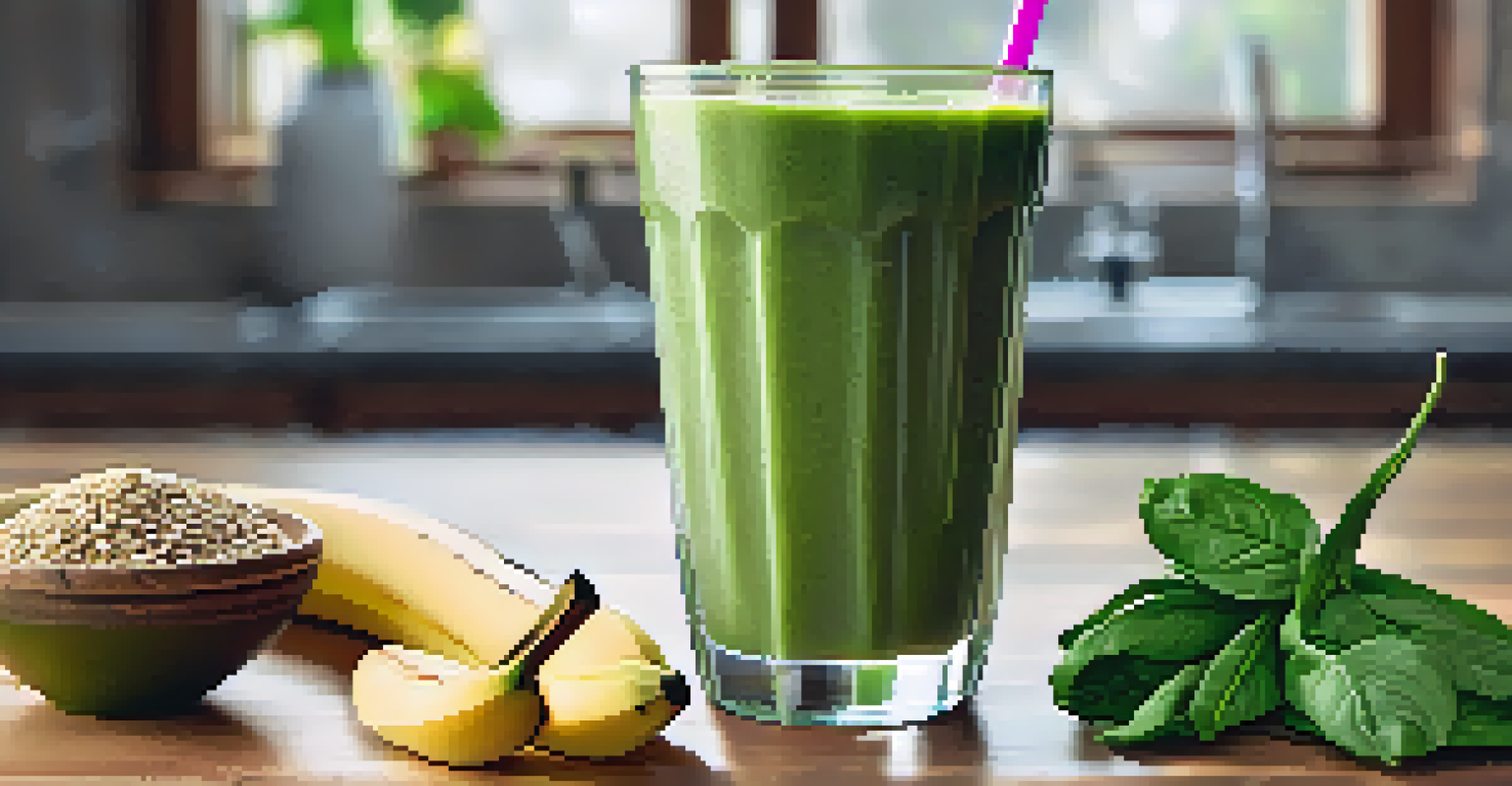Tailoring Bodybuilding Nutrition for Vegan Athletes

Understanding Vegan Bodybuilding Nutrition Basics
Vegan bodybuilding nutrition focuses on plant-based foods to fuel workouts and support muscle growth. Unlike traditional diets, veganism excludes all animal products, which means athletes need to be strategic about their food choices. Key nutrients like protein, iron, and omega-3 fatty acids are crucial for muscle recovery and overall health.
The food you eat can be either the safest and most powerful form of medicine or the slowest form of poison.
A well-rounded vegan diet for bodybuilding includes a variety of legumes, grains, vegetables, nuts, and seeds. These options not only provide essential nutrients but also offer different flavors and textures that keep meals interesting. By incorporating a rainbow of plant foods, vegan athletes can ensure they're getting a mix of vitamins and minerals to support their training.
Understanding how to meet macro and micronutrient needs is vital. This means not just focusing on protein but also ensuring adequate intake of carbohydrates for energy and healthy fats for hormone production. With careful planning, vegan athletes can build muscle just as effectively as their omnivorous counterparts.
Key Nutrients for Vegan Bodybuilders to Focus On
Protein is perhaps the most talked-about nutrient in bodybuilding, and it's essential for muscle repair and growth. Vegan athletes can find protein in foods like lentils, chickpeas, quinoa, and hemp seeds. Combining different protein sources throughout the day can help ensure they get all the essential amino acids needed for optimal muscle performance.

Iron is another critical nutrient, especially since plant-based sources of iron are not as easily absorbed as those from animal products. Foods such as spinach, beans, and fortified cereals can help meet iron needs, but pairing them with vitamin C-rich foods like oranges or bell peppers can boost absorption. This is particularly important for recovery and sustaining energy during workouts.
Focus on Key Nutrients
Vegan bodybuilders should prioritize protein, iron, and omega-3 fatty acids to support muscle growth and recovery.
Don’t forget about healthy fats! Omega-3 fatty acids are vital for reducing inflammation and supporting joint health. Vegan sources include chia seeds, flaxseeds, and walnuts. Incorporating these into the diet ensures that vegan bodybuilders can recover more effectively and perform at their best.
Crafting a Balanced Vegan Meal Plan
Creating a balanced meal plan for a vegan bodybuilding diet involves a bit of creativity and foresight. Start with a good mix of macronutrients at each meal, aiming for a combination of protein, healthy fats, and carbohydrates. For example, a quinoa salad with black beans, avocado, and a variety of colorful vegetables offers a nutrient-dense meal that supports muscle growth.
Let food be thy medicine and medicine be thy food.
Meal prepping can be a game-changer for busy vegan athletes. By preparing meals in advance, they can ensure they have ready-to-eat options that align with their nutritional goals. This not only saves time but also helps avoid the temptation of less healthy convenience foods when hunger strikes.
It's also important to listen to your body and adjust portions based on workout intensity and personal energy needs. Some days may require more carbohydrates for fuel, while others might need an extra focus on protein for recovery. A flexible meal plan can help accommodate these changing needs.
The Role of Supplements in Vegan Bodybuilding
While a well-planned vegan diet can meet most nutritional needs, some athletes may benefit from supplements. For instance, protein powders derived from pea, rice, or hemp can help boost protein intake, especially post-workout when the body needs it most. These supplements can be a convenient way to ensure adequate protein consumption without excess calories.
Additionally, certain nutrients like vitamin B12, vitamin D, and omega-3 fatty acids may be harder to obtain from a vegan diet alone. B12, which is essential for energy and nerve function, is primarily found in animal products, so a supplement is often recommended for vegans. Likewise, vitamin D can be synthesized from sunlight, but during winter months or for those living in less sunny regions, supplementation is wise.
Crafting Balanced Meal Plans
A well-rounded vegan meal plan combines macronutrients creatively to ensure adequate energy and nutrition for workouts.
It's crucial for vegan athletes to consult with a healthcare professional before starting any supplements. This ensures they are targeting their specific nutritional gaps without overdoing it. A tailored approach to supplementation can complement a robust vegan diet and enhance overall performance.
Hydration: A Key Element of Vegan Bodybuilding
Hydration often takes a backseat in discussions about nutrition, but it's a critical component for all athletes, including vegans. Water supports digestion, nutrient absorption, and overall bodily functions, making it essential for peak performance. Vegan athletes should aim to drink plenty of water throughout the day, especially before, during, and after workouts.
In addition to plain water, incorporating hydrating foods can help maintain hydration levels. Fruits and vegetables like cucumbers, watermelon, and oranges have high water content and provide essential vitamins and minerals. These foods can be particularly refreshing and beneficial during hot training sessions or in warmer climates.
Lastly, electrolyte balance is important, especially during intense workouts. Vegan athletes can replenish lost electrolytes by consuming foods rich in potassium and sodium, such as bananas, coconut water, and pickles. Keeping track of hydration and electrolytes will help maintain energy levels and optimize performance.
Understanding Vegan Protein Sources for Bodybuilding
Not all protein sources are created equal, and understanding this can help vegan athletes make informed choices. Plant-based proteins often differ in their amino acid profiles, which are the building blocks of protein. Combining foods like rice and beans or peanut butter on whole grain bread can create a complete protein, ensuring that all essential amino acids are present.
Some vegan protein sources, like soy products (tofu, tempeh, edamame), are considered complete proteins because they contain all nine essential amino acids. Incorporating these foods into meals can simplify the process of meeting protein needs. Additionally, legumes, lentils, and chickpeas are rich in both protein and fiber, making them excellent choices for satiety and digestive health.
Importance of Hydration
Staying hydrated is crucial for vegan athletes, as it supports digestion, nutrient absorption, and overall performance.
Exploring various protein sources can also keep meals exciting and diverse. From protein-packed smoothies to hearty bean burgers, the options are plentiful. Embracing the versatility of plant-based proteins can help athletes stick to their nutritional goals while enjoying their food.
Tracking Progress and Adjusting Nutrition Strategies
As with any fitness journey, tracking progress is essential for vegan athletes to understand what's working and where adjustments are needed. Keeping a food journal can help identify patterns in energy levels, performance, and recovery. This insight allows athletes to tweak their nutrition strategies based on their unique experiences and needs.
Regularly assessing body composition and strength gains can also provide valuable feedback. For instance, if muscle gain is slower than expected, it may be time to increase protein intake or adjust meal timing. On the other hand, if energy levels are low, examining carbohydrate intake could be beneficial.

Ultimately, nutrition should be a dynamic aspect of training. Rather than viewing it as a rigid set of rules, consider it an evolving strategy that responds to changes in workouts and personal goals. This approach helps vegan athletes stay motivated and engaged on their bodybuilding journey.